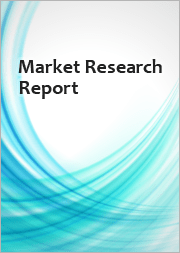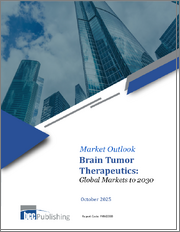
|
시장보고서
상품코드
1660072
가뇌종양 시장 : 현황 분석 및 예측(2024-2032년)Pseudotumor Cerebri Market: Current Analysis and Forecast (2024-2032) |
||||||
가뇌종양 시장은 예측 기간 동안(2024-2032년) CAGR 5.5%의 대폭적인 성장이 예상됩니다. 가뇌종양 시장은 특히 출산 적령기 여성에서 가뇌종양의 주요 원인인 비만 증가에 의해 크게 견인되고 있습니다. 이미지 솔루션과 요추 천자 솔루션과 같은 진단 솔루션에 대한 의식 증가와 강화가 가뇌종양 시장을 견인하는 요인입니다. 이 시장의 성장은 수술 및 성공적인 투약 치료와 같은 최소한의 침습을 포함한 새로운 치료법에 대한 연구가 증가하고 있기 때문입니다. 또한, 신경질환과의 싸움을 위한 정부의 이니셔티브 증가와 특발성 두개내 압항진증의 병태생리학에 관한 연구는 치료적 개입의 개발에 기여하고 있으며, 이 질환의 관리에 관한 시장의 가능성을 계속 확대하고 있습니다.
가뇌종양 진단에서 신경 영상 진단 분야는 2023년 시장 점유율에서 가장 높습니다. 이 이점은 하이테크 이미징, MRI, CT로 인한 것이며, 이들은 확인되지는 않지만 종양 및 CNS 형태의 변화를 포함하여 ICP 상승의 다른 원인을 배제하는 데 필요합니다. 신경 영상은 진단에 중요한 요소이며,이 기술은 다른 방법에 비해 침습성이 낮고 정확하고 신뢰할 수 있기 때문에 일반적이며 의사의 선택입니다. 가까운 미래 시장 성장은 비교적 보수적이지만, 안저경 검사 분야는 급속한 확대가 예상됩니다. 이 성장은 특히 유두 부종과 같은 가뇌종양의 조기 발견 증가와 OCT를 포함한 안과 영상의 사용으로 인한 것입니다. 이러한 도구는 진단 정확도를 향상시키고 시력 저하를 피하기 위해 조기 치료가 중요하므로 질병의 조기 발견에 도움이 됩니다. 또한 혁신적이고 저렴한 안저경 기술의 진보로 선진국 시장과 신흥국 시장 모두에서 제품 라인업이 충실합니다.
치료법별로, 약물 요법은 가뇌종양 치료에서 가장 높은 시장 점유율을 차지합니다. 첫 번째 선택 약물은 아세타졸라미드와 토피라마트입니다. 이들은 수액 형성과 실제 두개 내압을 감소시키기 때문에 가장 일반적으로 사용됩니다. 특히 중증도가 경도에서 중등도인 경우에는 다른 치료법보다 비침습적이고 저렴하며 환자나 의사에게 이용하기 쉽습니다. 그러나, 정맥동 스텐트 유치술을 커버하는 부문은 앞으로 큰 성장 가능성을 갖고 있을 것으로 예상됩니다. 이것은 가장 흔한 원인인 정맥동 협착증과 관련된 가뇌종양의 관리에서 치료 효과가 확인되고 있기 때문입니다. 정맥동 스텐트 유치술의 접근법은 침습성이 낮고, 두개 내압의 조절과 증상의 개선에 효과적인 결과가 입증되어 병태생리학적 원인을 직접 표적으로 한 장기적인 결과를 가져옵니다.
최종 사용자별로는 가뇌종양의 진단 및 치료에 있어서 병원 분야가 가장 높은 시장 점유율을 차지하고 있습니다. 병원은 신경 영상 설비와 요추 천자를 포함한 진단 기기에의 접근이 용이하고, 션트술이나 정맥동 스텐트 유치술 등의 수술을 실시할 수 있는 제일선의 의료 시설입니다. 또한 신경과 의사, 안과의사, 외과의사 등 다양한 전문의가 있는 병원에서는 심각한 질환의 치료가 이루어지기 때문에 이 분야 수요는 큽니다. 그러나 신경질환과 안과질환 치료에 특화된 외래 클리닉에 대한 접근성 향상과 같은 많은 요인들로 인해 클리닉 부문이 미래에 확대될 것으로 예상됩니다.
가뇌종양 시장 도입에 대한 이해를 깊게 하기 위해 북미(미국, 캐나다, 기타 유럽), 유럽(독일, 프랑스, 영국, 스페인, 이탈리아, 기타 유럽), 아시아태평양(중국, 일본, 인도, 기타 아시아태평양) 및 기타 지역 세계 시장에서의 존재를 바탕으로 분석했습니다. 아시아태평양은 비만률 상승, 의료비 상승, 질병에 대한 의식 향상, 의료 관광의 중요성 증가 등의 요인으로 인해 미래에 가장 높은 성장을 이룰 것으로 보입니다. 중국, 인도, 일본 등 APAC 국가에서의 의료 확대와 미개척 시장은 APAC를 중요한 성장 시장으로 만들고 있습니다.
이 시장에서 사업을 전개하는 주요 기업으로는 McKesson Corporation, Santen Pharmaceutical Co. Ltd., Sanofi, Polpharma, Pfizer Inc., Sandoz AG, Viatris Inc., Medtronic Plc., SOPHYSA, Teva Pharmaceutical Industries Ltd. 등이 있습니다.
목차
제1장 시장 개요
- 시장의 정의
- 주요 목적
- 이해관계자
- 제한 사항
제2장 분석 방법 및 전제조건
- 분석 프로세스
- 분석 방법
- 응답자 프로파일
제3장 주요 요약
- 업계 요약
- 부문별 전망
- 시장 성장의 강도
- 지역 전망
제4장 시장 역학
- 성장 촉진요인
- 기회
- 성장 억제요인
- 동향
- PESTEL 분석
- 수요측 분석
- 공급측 분석
- 기업 합병 및 인수(M&A)
- 투자 시나리오
- 업계 인사이트 : 주요 스타트업 기업 및 그 독자적인 전략
제5장 가격 분석
- 가격 분석 : 지역별
- 가격에 영향을 미치는 요인
제6장 세계의 가뇌종양 시장 수익(2022-2032년)
제7장 시장 분석 : 진단별
- 안저 검사
- 신경 화상
- 요추천자
- 기타
제8장 시장 분석 : 치료법별
- 척수액 션트
- 시신경초개창술
- 정맥동 스텐트 유치술
- 투약요법
제9장 시장 분석 : 최종 사용자별
- 병원
- 클리닉
- 기타
제10장 시장 분석 : 지역별
- 북미
- 미국
- 캐나다
- 기타 북미
- 유럽
- 독일
- 영국
- 프랑스
- 이탈리아
- 스페인
- 기타 유럽
- 아시아태평양
- 중국
- 일본
- 인도
- 기타 아시아태평양
- 세계 기타 지역
제11장 밸류체인 분석
- 한계 분석
- 시장 진출기업의 일람
제12장 경쟁 구도
- 경쟁 대시보드
- 기업의 시장 포지셔닝 분석
- Porter's Five Forces 분석
제13장 기업 프로파일
- McKesson Corporation
- 기업 개요
- 주요 재무 지표
- SWOT 분석
- 제품 포트폴리오
- 최근의 동향
- Santen Pharmaceutical Co., Ltd
- Sanofi
- Polpharma
- Pfizer Inc.
- Sandoz AG
- Viatris Inc.
- Medtronic plc
- SOPHYSA
- Teva Pharmaceutical Industries Ltd.
제14장 약어 및 전제조건
제15장 부록
AJY 25.03.14Pseudotumor cerebri, also known as idiopathic intracranial hypertension (IIH), is a neurological disorder in which the pressure that surrounds the brain and spinal cord (intracranial pressure) is higher than normal, but there is no inflammation, infection, tumor, or other conditions that can explain this increase. This condition is more prevalent in pregnant women and women of childbearing age with excess body weight or obesity. The exact etiology has yet to be ascertained although it is likely related to a malfunction in the regulation of CSF. The early symptoms are usually chronic headaches, and changes in vision, for example, blurring, diplopia or temporary loss of vision, pulsating tinnitus, and increased intracranial pressure papilledema. If left untreated may lead to permanent blindness. Diagnostics consists of clinical examination and assessment, brain imaging to rule in and out other pathological possibilities, and obtaining CSF pressure by lumbar puncture. Management involves a reduction of intracranial pressure, for which some patients may be recommended to lose weight, take medications, particularly acetazolamide, undertake optic nerve sheath fenestration, or spinal fluid shunt should be used if the condition becomes extreme.
The Pseudotumor Cerebri Market is expected to grow with a significant CAGR of 5.5% during the forecast period (2024-2032). The pseudotumor cerebri market is majorly driven by increased incidences of obesity, which is a major cause of pseudotumor cerebri especially among women of childbearing age. Rising awareness and enhancing diagnostic solutions like imaging solutions and lumbar puncture solutions are the factors that drive the pseudotumor cerebri market. The growth of the market is due to the increasing research of new treatment methods, which may include minimal invasions, such as surgical operations and successful medication therapeutics. Furthermore, increased efforts by the governments to combat neurological disorders, and research on the pathophysiology of idiopathic intracranial hypertension contribute to the development of therapeutic interventions, which continue to extend the market potential for the management of this disorder.
In the diagnosis of pseudotumor cerebri, the neuroimaging segment has the highest market share in the year 2023. This dominance is due to high-tech imaging, MRI, and CT, which are required to rule out other causes of raised ICP, including tumors or altered CNS morphology, although rarely identified. Neuroimaging is an important component in diagnostics and this technique is common due to its lack of invasiveness, accuracy, and reliability as compared to other methods making it doctors' choice. While the growth of the market in the near future is relatively conservative, the fundoscopy segment is likely to show rapid expansion. This growth is attributable to the rising incidence of early recognition of pseudotumor cerebri, particularly papilledema, and the use of ophthalmic imaging, including OCT. These tools improve diagnostic precision and aid in early detection of the ailment as early treatment is critical to avoid vision loss. Also, advances in innovative and affordable fundoscopy technology have enriched product offerings in both developed and emerging markets.
Based on treatment, the medication segment has the highest market share in the treatment of pseudotumor cerebri. The first-choice drugs are acetazolamide and topiramate; they are most commonly used because they help reduce CSF formation and actual intracranial pressure. It is non-invasive, cheaper, and more easily accessible to the patient and physician than other forms of treatment, especially in cases of mild to moderate severity of the illness. However, the segment covering venous sinus stenting is expected to have great potential for growth in the future. This was attributed to the rising confirmation of the therapeutic effects in the management of pseudotumor cerebri related to venous sinus stenosis, the most prevalent cause. The approach of venous sinus stenting is less invasive and provides a long-term outcome directly targeting the pathophysiologic cause with evidenced effective outcomes in controlling the intracranial pressure and symptomatic improvement.
Based on the end-user, the hospital segment accounts for the highest market share in the diagnosis as well as in the treatment of Pseudotumor Cerebri. Hospitals are the first-line healthcare facilities with easy ability to access diagnostic equipment including neuroimaging facilities and lumbar puncture and to carry out surgical processes such as shunting or venous sinus stenting. Also, severe types of diseases are treated in hospitals with various specialists such as neurologists, ophthalmologists, and even surgeons leading to huge demand for this segment. However, the clinics segment is anticipated to expand in the future due to numerous factors such as enhanced access to outpatient clinics specialized in treating neurological and ophthalmological conditions.
For a better understanding of the market adoption of Pseudotumor Cerebri is analyzed based on its worldwide presence in regions such as North America (U.S., Canada, and the Rest of North America), Europe (Germany, France, U.K., Spain, Italy, Rest of Europe), Asia-Pacific (China, Japan, India, Rest of Asia-Pacific), Rest of World. Asia-Pacific region will have the highest future growth due to factors such as rising obesity rates, escalating healthcare expenditure, improving disease awareness, and the growing importance of medical tourism. Healthcare expansion and the largely untapped markets in APAC countries such as China, India, and Japan make APAC an important growth market.
Some of the major players operating in the market include McKesson Corporation, Santen Pharmaceutical Co., Ltd., Sanofi, Polpharma, Pfizer Inc., Sandoz AG, Viatris Inc., Medtronic Plc., SOPHYSA, Teva Pharmaceutical Industries Ltd.
TABLE OF CONTENTS
1.MARKET INTRODUCTION
- 1.1. Market Definitions
- 1.2. Main Objective
- 1.3. Stakeholders
- 1.4. Limitation
2.RESEARCH METHODOLOGY OR ASSUMPTION
- 2.1. Research Process of the Pseudotumor Cerebri Market
- 2.2. Research Methodology of the Pseudotumor Cerebri Market
- 2.3. Respondent Profile
3.EXECUTIVE SUMMARY
- 3.1. Industry Synopsis
- 3.2. Segmental Outlook
- 3.2.1. Market Growth Intensity
- 3.3. Regional Outlook
4.MARKET DYNAMICS
- 4.1. Drivers
- 4.2. Opportunity
- 4.3. Restraints
- 4.4. Trends
- 4.5. PESTEL Analysis
- 4.6. Demand Side Analysis
- 4.7. Supply Side Analysis
- 4.7.1. Merger & Acquisition
- 4.7.2. Investment Scenario
- 4.7.3. Industry Insights: Leading Startups and Their Unique Strategies
5.PRICING ANALYSIS
- 5.1. Regional Pricing Analysis
- 5.2. Price Influencing Factors
6.GLOBAL PSEUDOTUMOR CEREBRI MARKET REVENUE (USD BN), 2022-2032F
7.MARKET INSIGHTS BY DIAGNOSIS
- 7.1. Fundoscopy
- 7.2. Neuroimaging
- 7.3. Lumbar Puncture
- 7.4. Others
8.MARKET INSIGHTS BY TREATMENT
- 8.1. Spinal Fluid Shunt
- 8.2. Optic Nerve Sheath Fenestration
- 8.3. Venous Sinus Stenting
- 8.4. Medication
9.MARKET INSIGHTS BY END-USER
- 9.1. Hospitals
- 9.2. Clinics
- 9.3. Others
10.MARKET INSIGHTS BY REGION
- 10.1. North America
- 10.1.1. U.S.
- 10.1.2. Canada
- 10.1.3. Rest of North America
- 10.2. Europe
- 10.2.1. Germany
- 10.2.2. U.K.
- 10.2.3. France
- 10.2.4. Italy
- 10.2.5. Spain
- 10.2.6. Rest of Europe
- 10.3. Asia-Pacific
- 10.3.1. China
- 10.3.2. Japan
- 10.3.3. India
- 10.3.4. Rest of Asia-Pacific
- 10.4. Rest of World
11.VALUE CHAIN ANALYSIS
- 11.1. Marginal Analysis
- 11.2. List of Market Participants
12.COMPETITIVE LANDSCAPE
- 12.1. Competition Dashboard
- 12.2. Competitor Market Positioning Analysis
- 12.3. Porter Five Forces Analysis
13.COMPANY PROFILES
- 13.1. McKesson Corporation
- 13.1.1. Company Overview
- 13.1.2. Key Financials
- 13.1.3. SWOT Analysis
- 13.1.4. Product Portfolio
- 13.1.5. Recent Developments
- 13.2. Santen Pharmaceutical Co., Ltd
- 13.3. Sanofi
- 13.4. Polpharma
- 13.5. Pfizer Inc.
- 13.6. Sandoz AG
- 13.7. Viatris Inc.
- 13.8. Medtronic plc
- 13.9. SOPHYSA
- 13.10. Teva Pharmaceutical Industries Ltd.



















